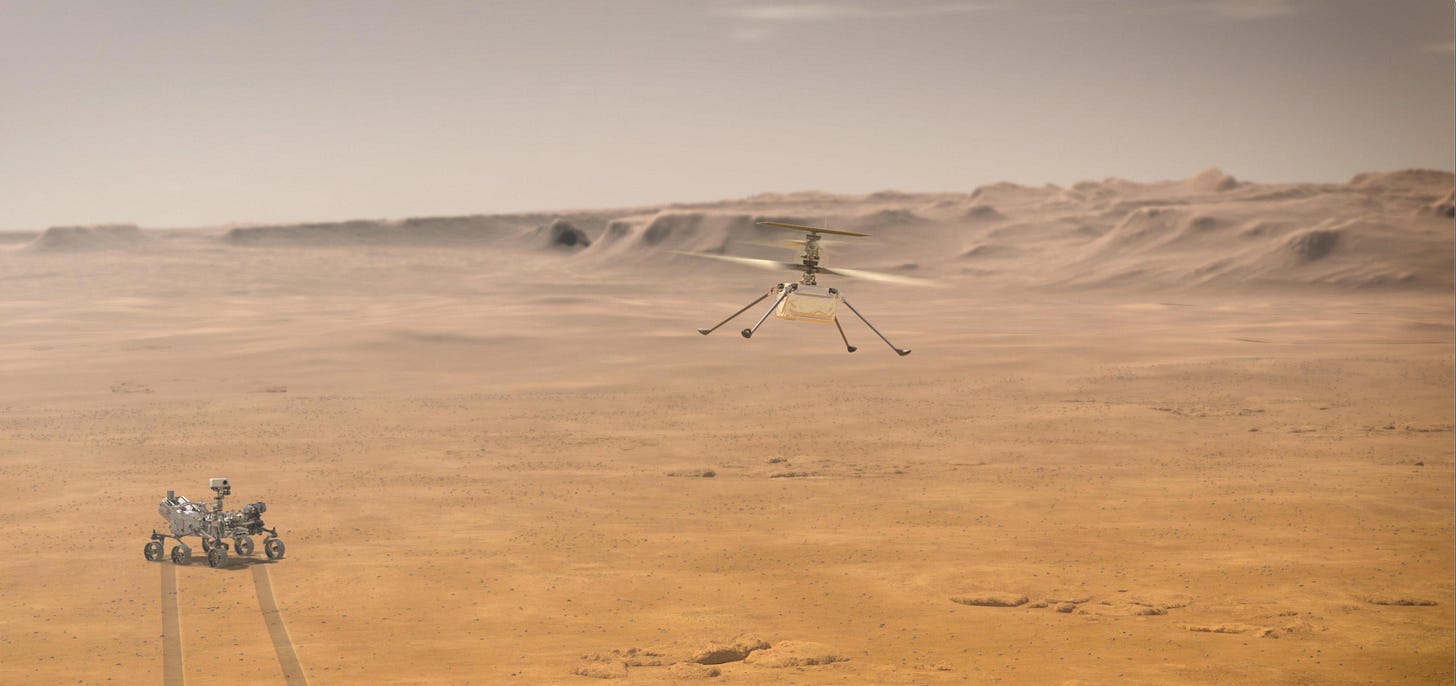🗞 NAND Circuit #1
A Penguin on Mars, Google growing a conscience, WhatsApp holding its users hostage and level 3 autonomous cars.
Welcome to the first issue of the NAND Circuit 🎉! I’m so excited and nervous at the same time that you’re reading this! NAND Circuit briefs you about the latest news and happenings in the tech world, emerging technologies, and the companies that run it. For now, I’m keeping this a weekly newsletter (possibly 2 times a week). Giving me enough time to find my niche and momentum. This newsletter is fueled by my hatred towards social media and news corporations that have ruined how we read content on the web. With annoying cookie-setting pop-ups, targeted ads, biases, clickbait titles, and bizarre layouts with interrupting recommender feeds, the news is no longer just about reading the news. On the contrary NAND circuit aims to be clutter-free, clean, and just about the news with a mild forecast of cringe puns 🙃. Anyway, proceed indulging 🥂 !
In this issue:
🐧 NASA sends a penguin to Mars
🍪 Google grows a conscience and shocks everyone
💬 WhatsApp plans to hold its users hostage
🚘 Honda beats Tesla to the punch
🍕 Quick Bytes
NASA sends the most famous penguin to Mars.
NASA and the Soviets did send monkeys, mice, frogs, spiders, tortoises, and fish to space. But a penguin? *PETA has entered the chat* Well, this penguin loves kernels (not the ones from corn) 🙃.
You might’ve guessed it. But yes, I’m talking about Tux 🐧 , the mascot of Linux. NASA successfully landed its new rover, Perseverance on Mars last month. It was accompanied by a mini solar-powered helicopter, Ingenuity that runs on Linux. This makes Mars the second planet in our solar system with more computers running Linux than Windows 🙃. NASA has also open-sourced the software powering Ingenuity. This means that you can use the very same code which flies a copter on Mars for your own projects!
Perseverance also streamed its landing in 4k and sent a sample of how the wind sounds on mars! Its primary task is to seek signs of ancient life. And collect samples of rock and soil for a possible return to Earth. UAE’s Hope probe and China’s Tianwen-1 probe also reached mars earlier this year. They are all sending back crucial data that’ll help us understand the mysteries of Mars. With progressive steps taken towards the human exploration of mars, us Homo Sapiens becoming a multi-planetary species is not so far-fetched 🚀.
Google finally grows a conscience
Google comes up with a solution to combat the very problem it bred, third-party cookies 🍪 . These cookies are the reason why the sneakers 👟 you looked at weeks ago still stalk you all over the web. The solution Google is proposing is made possible by federated learning.
This new algorithm called FloC, will group the interests of like-minded users and deliver ads to the group as a whole, instead of extremely targeted privacy-invading ads. This is similar to Netflix and Spotify’s recommendation algorithms where users are pooled into interest groups.
Google plans to phase out third-party cookies by 2022. It isn’t the first to do this. Apple’s Safari limited cookie tracking in 2017 and Mozilla’s Firefox blocked third-party cookies in 2019. Make no mistake, even with this phase-out, it still has loads of first-party cookies to continue its targeted ads. It is sacrificing the accuracy of targeted ads to strengthen its monopoly on web advertising. If first-party cookies become the primary way of serving ads on the internet, Google and Facebook are the ones to benefit the most. Since advertisers will rely on them to collect user data. And they will have enough data collected by first-party cookies deployed on their “free” services used by billions every day. Though there might be less personal information gathered, targeted adverts aren’t going away anytime soon. Unless you switch to privacy-centric alternatives.
WhatsApp to hold its users hostage
WhatsApp is at the end of completing its transition from a communication platform to a data collection platform. WhatsApp will lock the accounts of users who don’t accept the controversial updates to its terms and conditions by May 15.

WhatsApp in January tried to sneak in an update to its privacy policy. But it was received with backlash as millions of users migrated to alternative privacy-focused services like Signal and Telegram.
With the new terms and conditions prompt, WhatsApp has demanded its users to allow their data to be shared with Facebook. And unsurprisingly, it also said that its practice of sharing data with Facebook was not new.
WhatsApp says that the shared data does not include messages, groups, or call logs. But it is already harvesting device level identifiers, IP addresses, and purchase info on behalf of Facebook. And now, with the new update, businesses on WhatsApp can manage your chats.
It is important to note that these new changes do not apply to users in the European Union and the UK, who are protected by the GDPR regulation. It is also important to note that the co-founders of WhatsApp left the company because of Facebook’s approach to user data, advertising, and encryption. And one of the co-founders moved on to cofound Signal, a non-profit organisation, which provides a secure privacy-focused alternative to WhatsApp.
At the end of the day, the story is simple. Facebook buys a popular service that supported itself with a nominal yearly recurring fee, for $16 billion. Makes it “free”. More users sign up, and the networking effects come to maximal fruition. And now Facebook wants a return on its investment. And this update is to facilitate that using your data. Make the switch.
Honda beats Tesla to the punch
Honda Launches the world’s first level 3 autonomous car in Japan, beating Tesla to the punch.
Previously with the widely available level 2 autonomy, cars can accelerate, brake, and steer without driver input, but drivers have to remain engaged at all times. But the level 3 autonomy gives cars environmental detection capabilities and can perform most driving tasks, but human override is still required. This means that the driver can be engaged in currently prohibited activities like texting behind the wheel, watching movies, and so on. Although these features are highly limiting (by law) and only available on expressways when traveling less than 50 km/hr.
Unlike Tesla’s AI and camera approach, Honda’s system uses data from maps and a global navigation satellite system. It also can detect the car's position and road conditions while the car's surroundings are monitored by external sensors. The system can alert the driver with vibrations and sounds if human override is required. And if the driver is unresponsive, the system will assist with an emergency stop by decelerating and stopping the vehicle while alerting surrounding cars with hazard lights and the horn.
Although this car is a limited edition of 100 units only, it gives Honda the bragging rights of being first. Tesla’s system, the FSD, which offers similar features to Honda’s level 3 is currently in beta and is expected to roll out in Q2. So if Tesla does match Honda’s level 3 with just the AI and camera, it will be a feat far superior.
🍕 Quick Bytes
AI powered service, called Deep Nostalgia using GANs gives life to old photos. Akin to live photos on iOS.
Scientists say we’d need global lockdowns every 2 years to meet Paris Climate Treaty goals.
China turns to in emotion recognition technology for surveillance. The technology tracks traits such as facial muscle movements, vocal tone and body movements to deduce a person’s feelings.
Privacy-focused browser Brave now has its own Google search rival.
Microsoft’s Mesh envisions Zoom calls powered by AR and VR experiences.
That’s all from me this week! If you liked this issue, forward it to your friends who might find it interesting. Bye bye 👋




